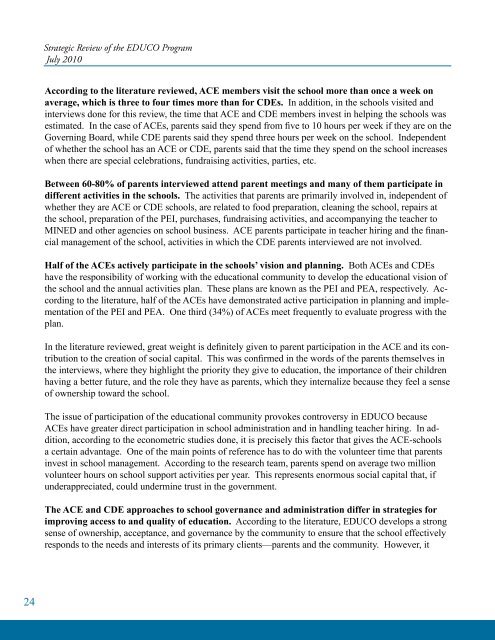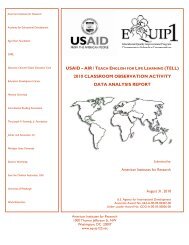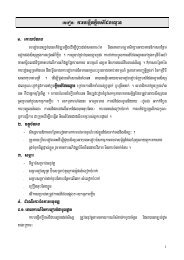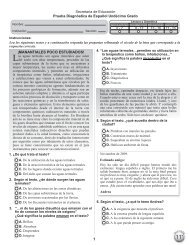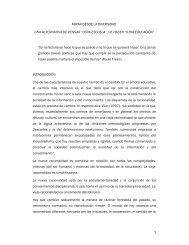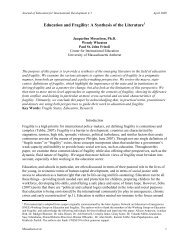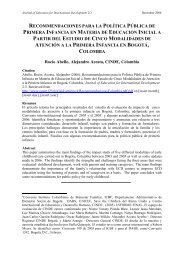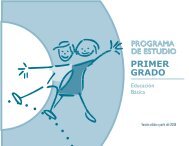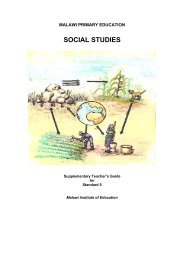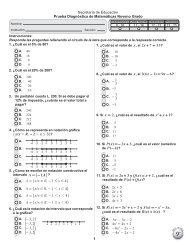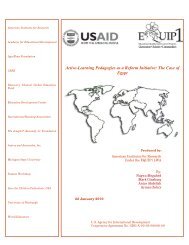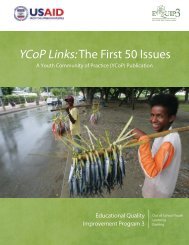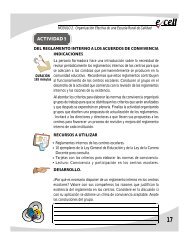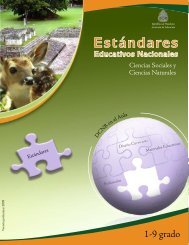<strong>Strategic</strong> <strong>Review</strong> <strong>of</strong> <strong>the</strong> <strong>EDUCO</strong> <strong>Program</strong>July 2010According to <strong>the</strong> literature reviewed, ACE members visit <strong>the</strong> school more than once a week onaverage, which is three to four times more than for CDEs. In addition, in <strong>the</strong> schools visited andinterviews done for this review, <strong>the</strong> time that ACE and CDE members invest in helping <strong>the</strong> schools wasestimated. In <strong>the</strong> case <strong>of</strong> ACEs, parents said <strong>the</strong>y spend from five to 10 hours per week if <strong>the</strong>y are on <strong>the</strong>Governing Board, while CDE parents said <strong>the</strong>y spend three hours per week on <strong>the</strong> school. Independent<strong>of</strong> whe<strong>the</strong>r <strong>the</strong> school has an ACE or CDE, parents said that <strong>the</strong> time <strong>the</strong>y spend on <strong>the</strong> school increaseswhen <strong>the</strong>re are special celebrations, fundraising activities, parties, etc.Between 60-80% <strong>of</strong> parents interviewed attend parent meetings and many <strong>of</strong> <strong>the</strong>m participate indifferent activities in <strong>the</strong> schools. The activities that parents are primarily involved in, independent <strong>of</strong>whe<strong>the</strong>r <strong>the</strong>y are ACE or CDE schools, are related to food preparation, cleaning <strong>the</strong> school, repairs at<strong>the</strong> school, preparation <strong>of</strong> <strong>the</strong> PEI, purchases, fundraising activities, and accompanying <strong>the</strong> teacher toMINED and o<strong>the</strong>r agencies on school business. ACE parents participate in teacher hiring and <strong>the</strong> financialmanagement <strong>of</strong> <strong>the</strong> school, activities in which <strong>the</strong> CDE parents interviewed are not involved.Half <strong>of</strong> <strong>the</strong> ACEs actively participate in <strong>the</strong> schools’ vision and planning. Both ACEs and CDEshave <strong>the</strong> responsibility <strong>of</strong> working with <strong>the</strong> educational community to develop <strong>the</strong> educational vision <strong>of</strong><strong>the</strong> school and <strong>the</strong> annual activities plan. These plans are known as <strong>the</strong> PEI and PEA, respectively. Accordingto <strong>the</strong> literature, half <strong>of</strong> <strong>the</strong> ACEs have demonstrated active participation in planning and implementation<strong>of</strong> <strong>the</strong> PEI and PEA. One third (34%) <strong>of</strong> ACEs meet frequently to evaluate progress with <strong>the</strong>plan.In <strong>the</strong> literature reviewed, great weight is definitely given to parent participation in <strong>the</strong> ACE and its contributionto <strong>the</strong> creation <strong>of</strong> social capital. This was confirmed in <strong>the</strong> words <strong>of</strong> <strong>the</strong> parents <strong>the</strong>mselves in<strong>the</strong> interviews, where <strong>the</strong>y highlight <strong>the</strong> priority <strong>the</strong>y give to education, <strong>the</strong> importance <strong>of</strong> <strong>the</strong>ir childrenhaving a better future, and <strong>the</strong> role <strong>the</strong>y have as parents, which <strong>the</strong>y internalize because <strong>the</strong>y feel a sense<strong>of</strong> ownership toward <strong>the</strong> school.The issue <strong>of</strong> participation <strong>of</strong> <strong>the</strong> educational community provokes controversy in <strong>EDUCO</strong> becauseACEs have greater direct participation in school administration and in handling teacher hiring. In addition,according to <strong>the</strong> econometric studies done, it is precisely this factor that gives <strong>the</strong> ACE-schoolsa certain advantage. One <strong>of</strong> <strong>the</strong> main points <strong>of</strong> reference has to do with <strong>the</strong> volunteer time that parentsinvest in school management. According to <strong>the</strong> research team, parents spend on average two millionvolunteer hours on school support activities per year. This represents enormous social capital that, ifunderappreciated, could undermine trust in <strong>the</strong> government.The ACE and CDE approaches to school governance and administration differ in strategies forimproving access to and quality <strong>of</strong> education. According to <strong>the</strong> literature, <strong>EDUCO</strong> develops a strongsense <strong>of</strong> ownership, acceptance, and governance by <strong>the</strong> community to ensure that <strong>the</strong> school effectivelyresponds to <strong>the</strong> needs and interests <strong>of</strong> its primary clients—parents and <strong>the</strong> community. However, it24
<strong>Strategic</strong> <strong>Review</strong> <strong>of</strong> <strong>the</strong> <strong>EDUCO</strong> <strong>Program</strong>July 2010combines <strong>the</strong> functions <strong>of</strong> school governance and administration in <strong>the</strong> organization run by <strong>the</strong> community.In most cases, this way <strong>of</strong> organizing school management implies a lack <strong>of</strong> pr<strong>of</strong>essional educationalmanagement, because <strong>of</strong> <strong>the</strong> kind <strong>of</strong> governing board that administers <strong>the</strong> school. However, on<strong>the</strong> o<strong>the</strong>r hand, this somewhat confusing blend <strong>of</strong> management and governance has <strong>the</strong> advantage that itcan ensure greater teacher accountability to <strong>the</strong> community. 5For its part, <strong>the</strong> CDE is organized so that <strong>the</strong> entire community can participate, since it includes <strong>the</strong> entireeducational community—teachers, students, and parents—and is under <strong>the</strong> leadership <strong>of</strong> <strong>the</strong> school’sprincipal. In this case, CDE schools appear to have pr<strong>of</strong>essional school management because <strong>of</strong> <strong>the</strong>appointment <strong>of</strong> school principals and teachers hired by <strong>the</strong> government. However, on <strong>the</strong> o<strong>the</strong>r hand, ithas much weaker instruments for making it responsible or accountable to <strong>the</strong> community. To a certainextent, <strong>the</strong> fundamental balance between <strong>the</strong> two school administration entities lies in <strong>the</strong> school’s accountabilityand pr<strong>of</strong>essional management.The Role <strong>of</strong> School PrincipalsAccording to <strong>the</strong> regulations for ACEs, school principals are not responsible for school administration;this falls to <strong>the</strong> parents on <strong>the</strong> ACE Governing Board. However, in reality many <strong>of</strong> <strong>the</strong> parentsinterviewed (in our focus groups and in <strong>the</strong> literature) admit that <strong>the</strong> principals and teachers <strong>of</strong>ferassistance with this job. It is probable that this “help” varies from being simply and truly just help, to inessence performing <strong>the</strong> duties, depending on many extremely complex factors. CDE school principalsare responsible for administrative and educational management and are <strong>the</strong> presidents <strong>of</strong> <strong>the</strong> CDEs. Inthis case, <strong>the</strong> difference between <strong>the</strong> authority and autonomy <strong>of</strong> ACE and CDE school principals can beseen, at least “in <strong>the</strong>ory,” although in practice <strong>the</strong> entities appear to be more than <strong>the</strong> “<strong>the</strong>ory” or regulationssay. Some <strong>of</strong> <strong>the</strong> interviewees mentioned cases <strong>of</strong> abuse <strong>of</strong> authority in <strong>the</strong> CDEs by principals.That is, in <strong>the</strong> ACEs <strong>the</strong> parents have responsibility, but at times do not use it; in <strong>the</strong> case <strong>of</strong> <strong>the</strong> CDEs,<strong>the</strong> principals have <strong>the</strong> responsibility, but at times abuse it and do not answer to <strong>the</strong> parents. What iscertain is that this situation shows that <strong>the</strong>re is a vacuum in <strong>the</strong> roles and responsibilities in <strong>the</strong> exercise<strong>of</strong> school management and confusion between <strong>the</strong> role <strong>of</strong> governance and <strong>of</strong> <strong>the</strong> daily management <strong>of</strong><strong>the</strong> schools in both school models. In reality, what is occurring is that <strong>the</strong>re is more variability withregard to accountability and effectiveness <strong>of</strong> government and management “within” <strong>the</strong> ACE model and“within” <strong>the</strong> CDE model than between <strong>the</strong> models. This suggests that many <strong>of</strong> <strong>the</strong> schools suffer from arelative lack <strong>of</strong> standards and training. Thus, <strong>the</strong> differences come from <strong>the</strong> idiosyncrasies <strong>of</strong> <strong>the</strong> particularschools and communities ra<strong>the</strong>r than from <strong>the</strong> models <strong>the</strong>mselves, which signals a lack <strong>of</strong> qualitycontrol and standardization by <strong>the</strong> government.Not all ACE schools (or CDE schools) have an appointed principal. According to <strong>the</strong> most recentdata, <strong>the</strong>re are only 530 appointed principals in ACE schools, while in CDE schools, <strong>the</strong>re are 969. InACE schools, 1,403 teachers who have not been appointed as principal are acting as such, in comparisonwith 711 in CDE schools. Fur<strong>the</strong>rmore, in ACE schools <strong>the</strong> leadership <strong>of</strong> <strong>the</strong> principal is relatively5 This report very frequently makes a distinction between “governance” and “management” and insists that, in part, <strong>the</strong> problem <strong>of</strong> school governance inEl Salvador is that <strong>the</strong> laws and regulations do not clearly distinguish between <strong>the</strong>se functions. This is a relatively technical issue, and <strong>the</strong>refore is notexplained in detail in <strong>the</strong> body <strong>of</strong> this document. Annex 4 contains a complete explanation.25


